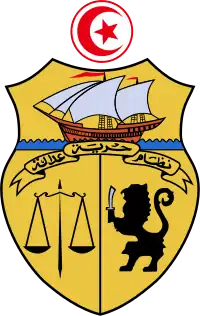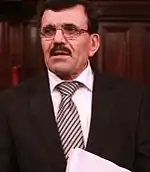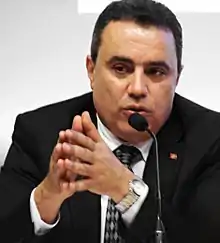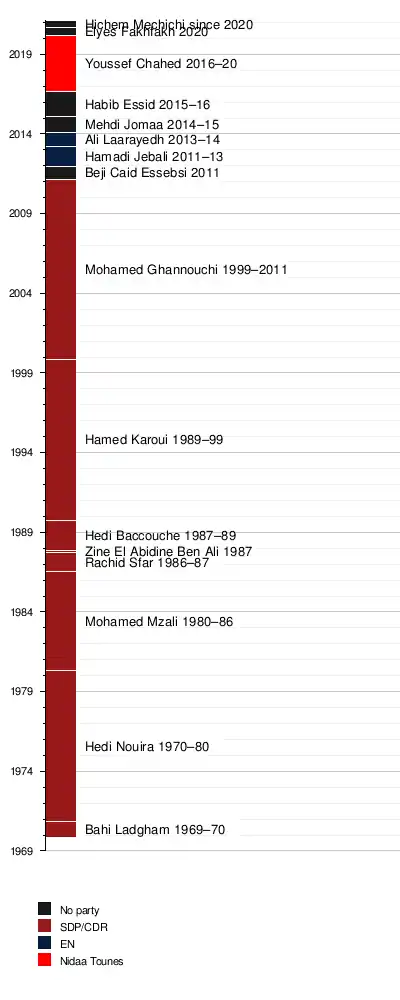Prime Minister of Tunisia
The prime minister of Tunisia (informally abbreviated to PM) is the head of government of Tunisia. The prime minister directs the executive branch along with the president, and, together with the prime minister's cabinet, is accountable to the chief of state, to the Assembly of the Representatives of the People, to the prime minister's political party and, ultimately, to the electorate for the policies and actions of the executive and the legislature.
| Prime Minister of Tunisia | |
|---|---|
 | |
| Cabinet of Tunisia Executive branch of the Tunisian Government | |
| Style | Mr. Prime Minister (informal) His Excellency (formal) |
| Status | 2nd highest in executive branch |
| Residence | Dar El Bey |
| Seat | Tunis |
| Nominator | Political parties |
| Appointer | President of Tunisia |
| Term length | No term limits specified |
| Constituting instrument | Constitution of Tunisia |
| Inaugural holder | Bahi Ladgham |
| Formation | November 7, 1969 |
| Salary | 8000 TND monthly[1] |
| Website | www |
The office was established by President Habib Bourguiba with the appointement of Bahi Ladgham as the first officeholder on 7 November 1969. Although the position existed as the prime minister of the Kingdom of Tunisia, it was abolished when Bourguiba proclaimed the Republic on 25 July 1957. The constitution of 1959 established a presidential system where the president was both the chief of state and the head of government. Bourguiba transferred some of his powers to the Prime Minister who had a background role. After the Tunisian Revolution in 2011, the Prime Minister was granted major attributions and shares the executive authority with the president. He has major influence over domestic policies while the chief of state mainly determines foreign and defense policies.
The president appoints as prime minister the nominee of the winning party in the legislative election, the one that holds the largest number of seats in the assembly. The prime minister-designate has a month to form a cabinet and submit to parliament for a motion of confidence. If obtained, the cabinet is sworn-in by the president and is accountable to him.
Fifteen people have held the office since 1969. The current prime minister, Hichem Mechichi was appointed by President Kais Saied. He assumed office on 2 September 2020 following the resignation of Elyes Fakhfakh.
History
Appointment
After the election, the president nominate the candidate of the party which gained the most votes to form a government within a month. The nominee must submit its program to the Assembly of the Representatives of the People and get the trust of the majority of its members before being formally appointed Prime Minister by the president. If it fails to form a government or if it does not get the confidence, the president initiates consultations with the political parties to find the best candidate. If, four months after the election, the Assembly did not give confidence in the prime minister, the president can call new election.
The prime minister swears to the following oath in the presence of the president:
I swear by Almighty God to work faithfully for the good of Tunisia, to respect its Constitution and laws, scrupulously to their interests and serve loyally.
Constitutional powers
The powers of the prime minister are established by the current Constitution of Tunisia of 2014. The prime minister is primarily responsible for domestic policy, while foreign policy, defense and domestic security are handled by the president.[2]
The prime minister is responsible for:
- Creating, amending and dissolving ministries (Except ministries of Defence and Foreign Affairs which require the president's approval).
- Creating, amending and dissolving public institutions, public entities and administrative departments.
- Issuing governmental decrees after consulting the Council of Ministers.
- Shall endorse and sign, where appropriate, regulatory orders issued by ministers.
- Request the parliament to give vote of confidence to their government.
The prime minister, together with the president, represent Tunisia at home and abroad.
In the event the president is temporarily unable to carry out his duties, the prime minister serves as Acting President for a maximum of 60 days. If the disability is permanent or the result of the president's resignation or death, the president of the Assembly of the Representatives of the People becomes interim president for a period of 45 to 90 days pending new elections.
List
Living former prime ministers
As of February 2021, there are seven living former Tunisian prime ministers. The most recent to die was Hamed Karoui (1989-99), on 27 March 2020.
 Rachid Sfar (age 87)
Rachid Sfar (age 87)
(1986–1987) Mohamed Ghannouchi (age 79)
Mohamed Ghannouchi (age 79)
(1999–2011) Hamadi Jebali (age 72)
Hamadi Jebali (age 72)
(2011–2013) Ali Laarayedh (age 65)
Ali Laarayedh (age 65)
(2013–2014) Mehdi Jomaa (age 58)
Mehdi Jomaa (age 58)
(2014–2015) Habib Essid (age 71)
Habib Essid (age 71)
(2015–2016) Youssef Chahed (age 45)
Youssef Chahed (age 45)
(2016–2020) Elyes Fakhfakh (age 49)
Elyes Fakhfakh (age 49)
(2020)
Timeline

Footnotes
- "La Misère de nos députés". Leaders.
- Anthony Dworkin (12 September 2019). "Tunisia's unpredictable elections". European Council on Foreign Relations.
